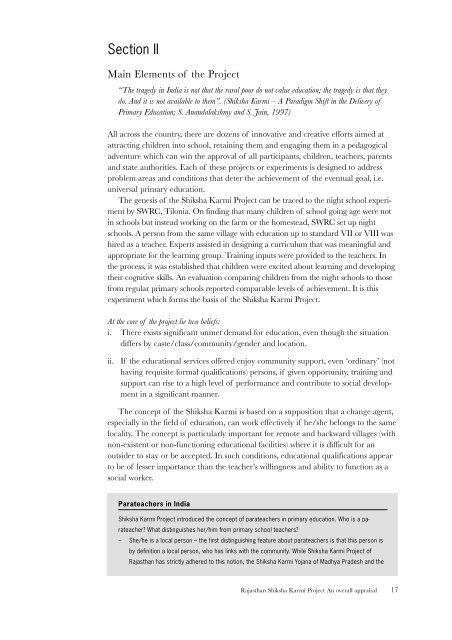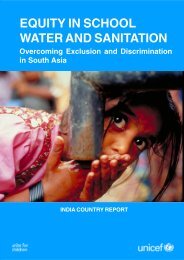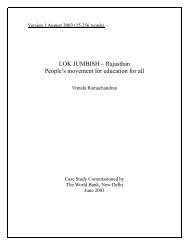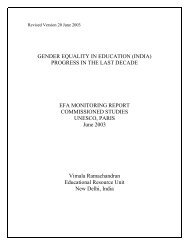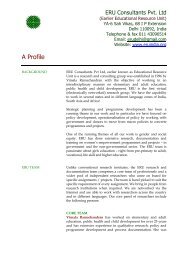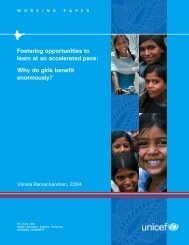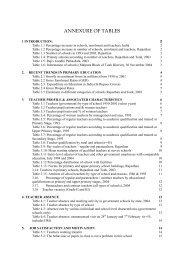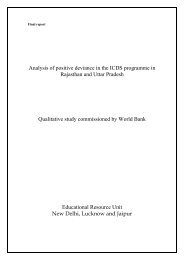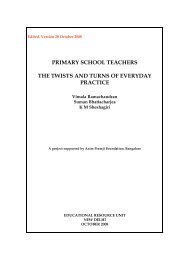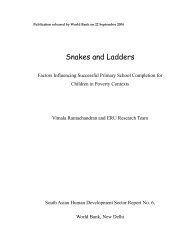Rajasthan Shiksha Karmi Project An overall appraisal
Rajasthan Shiksha Karmi Project An overall appraisal
Rajasthan Shiksha Karmi Project An overall appraisal
Create successful ePaper yourself
Turn your PDF publications into a flip-book with our unique Google optimized e-Paper software.
Section IIMain Elements of the <strong>Project</strong>“The tragedy in India is not that the rural poor do not value education; the tragedy is that theydo. <strong>An</strong>d it is not available to them”. (<strong>Shiksha</strong> <strong>Karmi</strong> – A Paradigm Shift in the Delivery ofPrimary Education; S. <strong>An</strong>andalakshmy and S. Jain, 1997)All across the country, there are dozens of innovative and creative efforts aimed atattracting children into school, retaining them and engaging them in a pedagogicaladventure which can win the approval of all participants, children, teachers, parentsand state authorities. Each of these projects or experiments is designed to addressproblem areas and conditions that deter the achievement of the eventual goal, i.e.universal primary education.The genesis of the <strong>Shiksha</strong> <strong>Karmi</strong> <strong>Project</strong> can be traced to the night school experimentby SWRC, Tilonia. On finding that many children of school going age were notin schools but instead working on the farm or the homestead, SWRC set up nightschools. A person from the same village with education up to standard VII or VIII washired as a teacher. Experts assisted in designing a curriculum that was meaningful andappropriate for the learning group. Training inputs were provided to the teachers. Inthe process, it was established that children were excited about learning and developingtheir cognitive skills. <strong>An</strong> evaluation comparing children from the night schools to thosefrom regular primary schools reported comparable levels of achievement. It is thisexperiment which forms the basis of the <strong>Shiksha</strong> <strong>Karmi</strong> <strong>Project</strong>.At the core of the project lie two beliefs:i. There exists significant unmet demand for education, even though the situationdiffers by caste/class/community/gender and location.ii.If the educational services offered enjoy community support, even ‘ordinary’ (nothaving requisite formal qualifications) persons, if given opportunity, training andsupport can rise to a high level of performance and contribute to social developmentin a significant manner.The concept of the <strong>Shiksha</strong> <strong>Karmi</strong> is based on a supposition that a change agent,especially in the field of education, can work effectively if he/she belongs to the samelocality. The concept is particularly important for remote and backward villages (withnon-existent or non-functioning educational facilities) where it is difficult for anoutsider to stay or be accepted. In such conditions, educational qualifications appearto be of lesser importance than the teacher’s willingness and ability to function as asocial worker.Parateachers in India<strong>Shiksha</strong> <strong>Karmi</strong> <strong>Project</strong> introduced the concept of parateachers in primary education. Who is a parateacher?What distinguishes her/him from primary school teachers?– She/he is a local person – the first distinguishing feature about parateachers is that this person isby definition a local person, who has links with the community. While <strong>Shiksha</strong> <strong>Karmi</strong> <strong>Project</strong> of<strong>Rajasthan</strong> has strictly adhered to this notion, the <strong>Shiksha</strong> <strong>Karmi</strong> Yojana of Madhya Pradesh and the<strong>Rajasthan</strong> <strong>Shiksha</strong> <strong>Karmi</strong> <strong>Project</strong> <strong>An</strong> <strong>overall</strong> <strong>appraisal</strong>17


